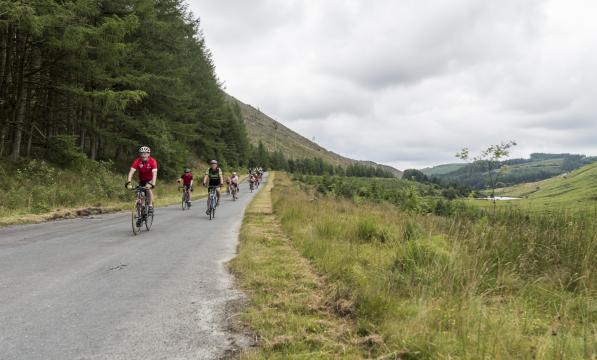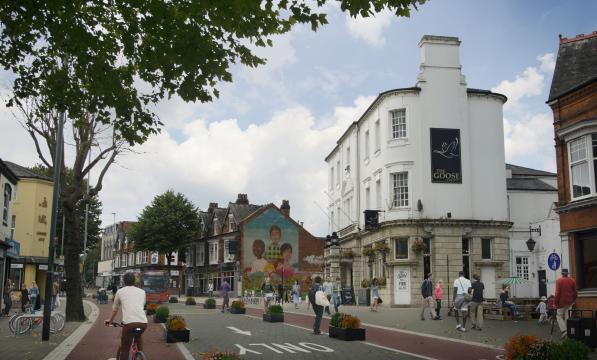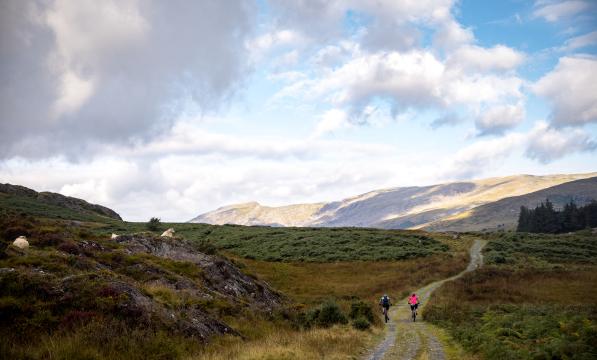Is this a new beginning for cycling in Newport?

On Tuesday 4 June, while Donald Trump was in London, another news story broke in Wales which has had rather less attention. Mark Drakeford AM, the First Minister for Wales, announced his decision to scrap the 'M4 Corridor around Newport' (M4CaN) scheme. The £1.4bn plan involved re-routing the M4 motorway for 15 miles to avoid two-lane bottleneck at the Brynglas tunnels at Newport. It would have destroyed the Gwent Levels, a hugely important wildlife habitat bounded by the Severn and Usk estuaries.
He said the main reason for his decision was that the scheme was unaffordable, given the Welsh Government's financial situation. But even if it had been affordable, he would still have rejected it - even though the public inquiry Inspector had supported it - because he gave "greater weight than the Inspector did to the adverse impacts that the project would have on the environment."
The public inquiry and ministerial decision
Back in May 2017, I gave evidence on behalf of Cycling UK at a public inquiry, speaking against the scheme. It had been strongly promoted by Mark Drakeford's predecessor Carwyn Jones AM. Hence it was widely expected to go ahead, whatever arguments we and our allies might make against it.
Despite this, I was persuaded to submit evidence by Hugh Mackay, one of Cycling UK's wonderful volunteer campaigners in Wales. He had been attending meetings of the Campaign Against the Levels Motorway (CALM). The main driving force of this alliance was the Wildlife Trusts Wales. They hired barristers to present the case that the proposed scheme would exacerbate climate change while doing irreparable damage to several Sites of Special Scientific Interest (SSSIs). The Gwent Levels are home to otters, water voles and breeding waders as well as many rare insects. it is also a very popular area for recreational cycling.
Whilst Hugh was hugely supportive of CALM's ecological arguments against the scheme, he was also concerned that the sustainable transport arguments were receiving insufficient attention. And if nobody else was making these arguments, he felt Cycling UK needed to do so.
He and I therefore prepared a proof of evidence (here's the summary and full version). We argued that the Welsh Government had failed to make the case for spending at least £1.4bn (and possibly a lot more, given the likelihood of cost increases) on a new motorway, because they had not considered (let alone modelled) any non-road alternatives, that might tackle Newport's congestion and pollution problems more effectively while causing less damage.
We and our allies in CALM enlisted the support of academics Prof Stuart Cole (Cardiff University), Prof John Whitelegg (Liverpool John Moores University) and Dr Steve Melia (University of the West of England) to act as expert witnesses. A big thank you to all of them for their input.
Our case was greatly strengthened though by Wales's Future Generations Commissioner Sophie Howe - who is appointed by Welsh Ministers to advise them on compliance with the Wellbeing of Future Generations (Wales) Act 2015. In written evidence to the inquiry (submitted in February 2017), she had cast doubt on whether the scheme could comply with the Act. She then issued a report in September 2018 - to which Sustrans had made a vital contribution - arguing that Newport's transport problems could be addressed far more effectively by spending on active and sustainable travel.
Yet the Inspector's inquiry report, submitted to Ministers at the same time, still recommended that the scheme should go ahead, even though the Inspector recognised that there were "strong competing interests".
By this time though, Carwyn Jones had announced that he would be standing down as First Minister. When Mark Drakeford was elected as his successor, the M4 decision was still on his desk.
Before he made it though, the Committee on Climate Change (who are the UK Government's statutory advisor on meeting its duties under the Climate Act 2008) had issued an assessment saying that the UK is badly off course for meeting its 4th and 5th Carbon budgets, with the transport sector being the biggest culprit.
Meanwhile both the Welsh Government and the Welsh Assembly had declared a 'climate emergency'. Given also the suggestion from the Future Generations Commissioner that going ahead with the scheme could breach the Wellbeing of Future Generations Act, it looked increasingly likely that Drakeford would reject the scheme.
New opportunities in Wales - get involved!
The day after Drakeford confirmed his decision, the Welsh Government's Economy and Transport Minister Ken Skates AM confirmed that he would set up a Commission to consider alternative plans. This is a huge opportunity for Cycling UK and our allies, notably Sustrans, Living Streets and Welsh Cycling.
Another decision made by Drakeford when he became First Minister was to appoint Lee Waters AM to the newly-created role of Deputy Minister for the Economy and Transport, to support Ken Skates. I have known Lee since he was Director of Sustrans in Wales. During his time in that role, Lee led the campaign for the Active Travel (Wales) Act. He is now the Minister responsible for implementing it. Having attended the Welsh Government's 'Active Travel (Wales) Board meeting yesterday, which Lee chaired, I can confirm his absolute determination to seize the opportunity to boost active travel in Wales.
The Act requires Welsh councils to plan walking and cycling networks (known as Integrated Network Maps) and make steady progress on implementing them, taking account of some excellent walking and cycling design standards in every highway or traffic scheme they design, and in all new developments. Yet until now, the Act has been hampered by a lack of investment from previous Welsh transport ministers. Under Ken Skates's and Lee Waters's leadership, that is now changing.
What's more, Welsh Ministers recently announced that they want to make 20mph the 'default' speed limit for most residential streets.
Given his previous known opposition to the M4 Newport scheme, Lee had to be excluded from having any role in the decision on it, to avoid compromising the impartiality required of the First Minister's decision. However the scheme's cancellation effectively frees up a lot of funding that now needs to be spent on a clean and healthy alternative transport strategy, including active travel.
Newport, in particular, is a city that desperately needs investment in active travel. While Cardiff, Bridgend and Swansea have developed ambitious plans under the Active Travel Act, Newport has so far languished in car-dependence. Much of the traffic that clogs up the Bryn Glas tunnels is actually local traffic.
Enabling people to get around by walking and cycling, in conjunction with the South Wales Metro plans, could massively reduce that congestion, in a way that would also be good for reducing pollution, physical inactivity and greenhouse gas emissions, rather than worsening these problems.
But all Welsh councils will be starting to consult on their next round of Integrated Network Maps in about a year's time. Hence we are keen to strengthen our local volunteer networks, not just in Newport but throughout Wales. If you'd like to get involved, wherever you are, please contact [email protected].






